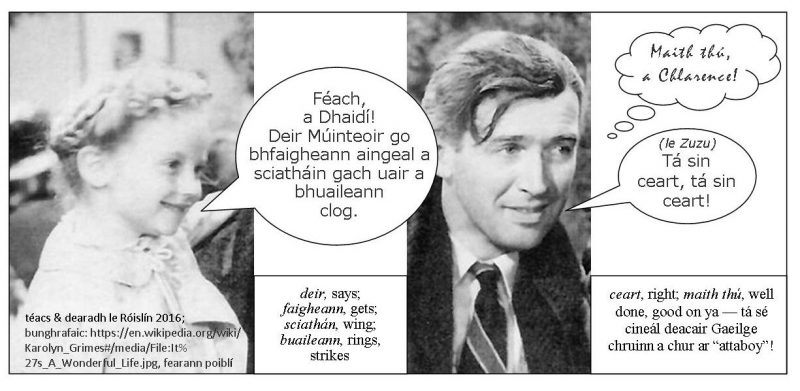Nuair a bhuaileann clog … (When a bell rings …): Zuzu’s Christmas Quote Translated into Irish Posted by róislín on Dec 16, 2016 in Irish Language
(le Róislín)
Continuing with our “It’s A Wonderful Life” theme, today’s blogpost looks at Zuzu Bailey’s famous quote from the movie, and her father’s response.
If you haven’t seen the movie — and is there anyone out there who hasn’t? — these lines come at the very end of the movie. Seo m’aistriúchán. Tá an bunleagan thíos.
Zuzu: Féach, a Dhaidí. Deir Múinteoir go bhfaigheann aingeal a sciatháin gach uair a bhuaileann clog.
George Bailey: Tá sin ceart, tá sin ceart … (ag amharc i dtreo na bhFlaitheas) … Maith thú, a Chlarence!
The graphic above explains some of the vocabulary, but, as always, a few more vocabulary and pronunciation notes will probably not go amiss.
Féach, a Dhaidí — fairly straightforward to translate. “Féach´ is in the command form (“Look!”) and “a Dhaidí” is in direct address. The “dh” is a sound we’ve discussed previously in many of these posts — nothing like the “dh” of Hindi/Sanskrit “Dharma,” by the way. And the sound is virtually non-existent in English, except in a few borrowed words. For now, just a technical note — it’s the voiced velar fricative, and if you search back through previous posts in this blog, you’ll find numerous guides to pronouncing it. In a nutshell, it’s a deep gargling sound that seems to rise up from the bottom of the throat. If that sounds like a challenge, well, it may be for native English-speakers, but one can’t speak Irish fluently without it. We need this sound to say such basic things as “Haigh, a Dhaidí” (Hi, Daddy), “dhá mhadra” (two dogs), and, since “gh” often has the same sound, we need it for “mo ghairdín” (my garden) and “Mo ghrá thú” (I love you).
Deir (says), followed by indirect statement, which is why “faigheann” (gets) changes to “go bhfaigheann” (gets). Now this “gh,” by the way, is silent, because it’s flanked by “dhá ghuta chaola.” And that’s a nice workout of two voiced velar fricatives in a row, followed by a voiceless one, the “ch,” which might be more familiar to most readers, since it is reasonably well known from “Chutzpah” and “Challah” in English, “Buch” in German, and “Bach” or “Fach” in Welsh.
Sciathán (wing) appears in the plural (sciatháin) in the quote. The final “n” now has a “tenser” sound because of the inserted “i.” I find that if you put your mouth in a smiling position, you get this “n caol” (slender “n”) sound naturally. And it’s not a bad outlook on life!
One nice point about “a sciatháin” — it can actually mean “his wings” or “her wings” or “their wings,” so it avoids the gender bias that English often has.
The phrase “gach uair” is followed by single-letter word “a” in our sentence. This “a” has no real meaning to be translated (it’s simply the “relative particle,” so it has function but no real definition). The “a” causes the word “buaileann” to get the inserted “h” and the pronunciation changes. It becomes “bhuaileann” (WOO-ul-yun OR VOO-ul-yun, depending on dialect).
As for George’s comment to Clarence (the angel), I was thinking of saying “Togha fir!” for “Maith thú!” since in normal, mortal-ish circumstances it would work just as well. If we’re addressing a man, that is, since “fir” is a form of “fear,” man. But I got kind of hung up on whether I should say “Togha fir!” or “Togha aingil!” — so I decided to stick with “Maith thú!” If anyone has any other suggestions for “Attaboy,” that would be most welcome (agus GRMARR).
Astute observers might have noticed that I “flipped” the direction the speakers are facing in the graphic above so we could see clearly that Zuzu is speaking first. In the original publicity still, George Bailey is on the viewer’s left, so if I had put the caption there, it would look like he was speaking first, then Zuzu.
Hope this was both fun, useful, and seasonal. — Róislín
Agus seo an bunleagan Béarla:
Zuzu: Look, Daddy. Teacher says, every time a bell rings an angel gets his wings.
George: That’s right, that’s right. [Looks heavenward] Attaboy, Clarence!
Nóta: GRMARR, go raibh maith agat roimh ré

Build vocabulary, practice pronunciation, and more with Transparent Language Online. Available anytime, anywhere, on any device.





Leave a comment: